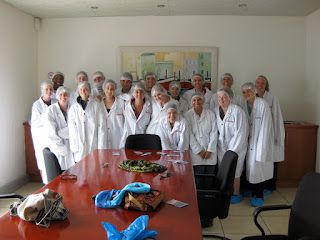
The highlight of this week was by far our trip to Swakopmund on the coast of Namibia. We had so many amazing opportunities while we were there, that touching them briefly in this blog would be doing them a serious injustice--so we are going to focus on the some of the highlights.
When we arrived in Swakopmund, we waited almost an entire five minutes before rushing of to the beach where many of us jumped into the water in our clothes. Everyone was really happy. To solidify our happy feelings, CGE treated us to dinner at the Lighthouse, which is a very nice restaurant.
Thursday morning we went on a tour of Swakopmund with our tour guide, Beatles. Beatles was incredibly insightful as to all the various factors of Swakopmund life and culture. We took a tour of Mondesa, the township of Swakopmund. It was interesting to see how the city of Swakopmund had dealt with issues of overcrowding in the township by moving people into the DRC which is essentially an informal settlement. It was only a temporary fix however since more people quickly moved back into the DRC filling the spaces others had left. The wealth disparity was made obvious by the difference in housing structures between the tourist areas of town and the townships. There were also long stretches of land which were equipped with power but which held no households. Many of us questioned afterwards why this land remained so habitable, yet no one lived there when there were so many issues of overcrowding. In Swakopmund, similar to in Windhoek, it is always surprising at how clear the towns transition into the townships and then the informal settlements. It is almost like these invisible boundaries exist which isolate people into a certain caste. In the DRC, we were shocked to learn about how water access was regulated and all the factors which are going into the pricing of water. Essentially, the city can only charge people in this area for water, so when determining water prices at the communal taps in the area, they factor in all expenditures that the local government needs to spend and adds that to the cost of water. We were alarmed at how such a basic necessity like water was so difficult to access because of the high costs on water. Since the system was also pre-paid, there is no way for people without credit to purchase water. We absolutely take advantage of water in the United States, and seeing a part of the world where water is one of the most valuable entities a person can have had a serious impact on all of us. We walked down the streets of Swakopmund with children swarming us from all sides. As we walked the streets, neighborhood kids all came out to walk the tour with us. Walking through the streets and seeing the children was incredibly inspiring. It never ceases to amaze us how despite great poverty and sometimes less than admirable situations, Namibian children never stop smiling. Beatles also took us to meet the Damara chief at her home. This was really interesting because we all felt like we were meeting a celebrity, and the Chief is also the first woman chief in the tribe--which is quite progressive. Namibia is working really hard to create equality between the sexes so seeing the first woman Chief felt like being a part of history.
That same day, we had the opportunity to go to Mondesa Youth Opportunities which is an after school program for the top students in each grade level across the city’s public school system. The Manager Naethra Sreekrishna, is an American volunteer who was able to inspire us because of her experience in Namibia and how she was able to explain it in a relatable way. She talked to us about the challenges facing the school as well as the amazing successes which were constantly occurring in the program. Before we had to ask, she explained why the program was targeting kids who were excelling and not children who were falling behind and needed extra help and she explained that the children who excel receive less attention in public schools and had already proven their motivation to succeed. Some of us had an in depth conversation with Naethra about how difficult it is to get working and volunteer visas in Namibia and how that has made it challenging to find teacher volunteers from other countries. It was interesting to see how the Namibian government is making it so difficult for foreigners to get working permits and to prevent them from being able to claim residency. While it is frustrating from the perspective of someone trying to get one of those permits, most of us agreed that we could understand how this was the government taking accountability for the high rates of unemployment by attempting to secure jobs for more Namibians. We had the opportunity to tour the site, and watch some of the children perform a dance. Then we played games with the kids--they were fascinating soccer players. The people in our group were so inspired by this visit, that many of them have chosen to spend their spring breaks volunteering with the organization.
As a wind down from our busy day, we all climbed up Dune 7 one evening and had the chance to see the most beautiful view of downtown Walvis Bay and the ocean. Many of us were able to conquer our fear of heights, and we all received a sufficient work out. We were all really sad when we had to say good-bye to the beach and head back to Windhoek.



No comments:
Post a Comment